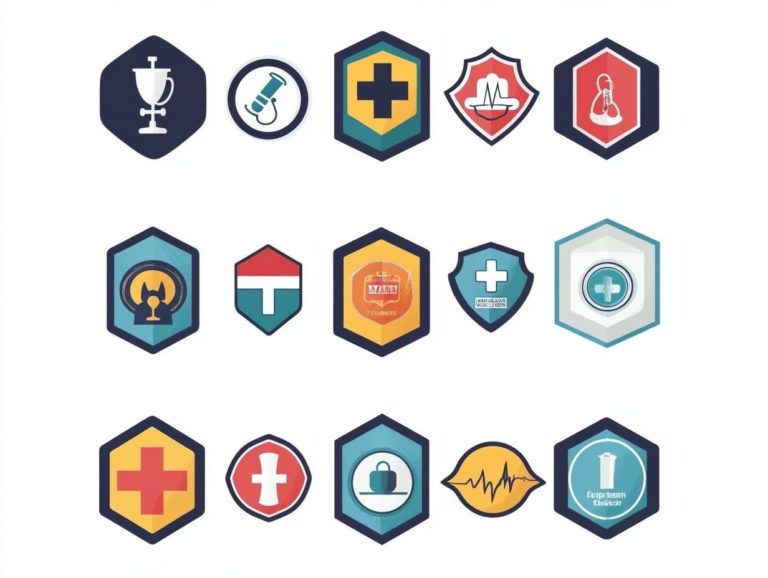8 Key Certifications for Healthcare Administrators
In the rapidly evolving healthcare landscape, certifications are essential for enhancing your skills and bolstering your credibility as an administrator.
This article delves into eight key certifications that have the potential to elevate your career, including the Certified Medical Manager (CMM) and Certified Healthcare Financial Professional (CHFP). You ll discover the significance of these credentials, the requirements for obtaining them, and the substantial benefits they can bring to your professional journey.
Whether you’re aiming to advance your skills or seeking new opportunities, these certifications are indispensable for achieving success in healthcare administration. Don t miss out on these crucial certifications that can propel your career forward!
Contents
- Key Takeaways:
- 1. Certified Medical Manager (CMM)
- 2. Certified Healthcare Financial Professional (CHFP)
- 3. Certified in Healthcare Privacy and Security (CHPS)
- 4. Certified Professional in Healthcare Information and Management Systems (CPHIMS)
- 5. Certified Professional in Healthcare Quality (CPHQ)
- 6. Certified Professional in Healthcare Risk Management (CPHRM)
- 7. Certified Healthcare Facility Manager (CHFM)
- 8. Certified Healthcare Safety Professional (CHSP)
- Why Are These Certifications Important for Healthcare Administrators?
- What Are the Requirements for Obtaining These Certifications?
- How Do These Certifications Benefit Healthcare Administrators?
- What Are the Costs Associated with Obtaining These Certifications?
- How Do These Certifications Demonstrate Competency in Healthcare Administration?
- What Are the Recertification Requirements for These Certifications?
- Are There Any Other Relevant Certifications for Healthcare Administrators?
- How Can Healthcare Administrators Determine Which Certification Is Right for Them?
- Frequently Asked Questions
- What are the 8 key certifications for healthcare administrators?
- How do I become a Certified Healthcare Administrative Professional (cHAP)?
- What are the benefits of becoming a Certified Professional in Healthcare Risk Management (CPHRM)?
- Can I become a Certified Medical Practice Executive (CMPE) with a non-clinical background?
- How does the Certified in Healthcare Privacy and Security (CHPS) certification benefit healthcare administrators?
- Can I hold more than one of these 8 key certifications for healthcare administrators?
Key Takeaways:

- Certified healthcare administrators with CMM possess expertise in managing medical practices and facilities effectively.
- CHFP certification equips healthcare administrators with financial management skills, enabling them to make informed decisions for their organization’s financial success.
- CHSP certification prepares healthcare administrators to implement and maintain safety measures to ensure the well-being of patients, staff, and visitors.
1. Certified Medical Manager (CMM)
The Certified Medical Manager (CMM) credential is a powerful statement of your dedication to excellence in healthcare administration. It showcases your expertise in working in complex healthcare settings and ensures compliance with industry standards.
By obtaining this certification, you demonstrate a complete understanding of healthcare management an essential asset for facility managers striving to enhance operational efficiency and improve the quality of care.
The certification process is no walk in the park; it involves rigorous examinations that challenge your competencies in areas such as financial management, strategic planning, and legal compliance.
The endorsement from the American Hospital Association lends significant credibility to this certification, adding immense value for those who pursue it. This endorsement validates the program and connects you with a network of industry leaders.
Getting your CMM certification could be a game changer for your career! It equips you with vital skills in team leadership, patient care optimization, and regulatory adherence, giving you the power to take on greater responsibilities and drive innovative solutions within your organization.
2. Certified Healthcare Financial Professional (CHFP)
The Certified Healthcare Financial Professional (CHFP) certification is crucial if you aspire to excel in healthcare financial management. It equips you with the essential tools to navigate the complexities of healthcare finance while ensuring compliance with financial regulations.
This certification also deepens your understanding of financial strategies and arms you with the skills required to optimize resource allocation and enhance financial performance within healthcare organizations.
By earning the CHFP, you significantly elevate your credibility, making you more competitive in a landscape that increasingly values specialized expertise. It complements other certifications, such as the Certified Medical Manager, broadening your knowledge and positioning you as a well-rounded leader in healthcare administration.
With a CHFP in hand, the career paths available to you are diverse, spanning from financial analyst roles to senior management positions. This ensures that you can make meaningful contributions to your organization and drive strategic initiatives with confidence.
3. Certified in Healthcare Privacy and Security (CHPS)
The Certified in Healthcare Privacy and Security (CHPS) credential is essential for professionals managing sensitive patient information. It equips you with the crucial skills needed to uphold privacy standards and navigate the intricate landscape of healthcare compliance.
In today’s digital age, where data breaches are alarmingly common, the importance of safeguarding patient information has never been more critical. The CHPS certification provides you with vital knowledge about rules to protect patient privacy and emphasizes proactive strategies to mitigate risks.
As a facility manager, you play a pivotal role in operational and strategic decision-making. It is imperative to align your practices with these rigorous standards. This alignment fosters patient trust, ensures compliance, reduces liability, and cultivates a culture of security within your healthcare organization.
4. Certified Professional in Healthcare Information and Management Systems (CPHIMS)
The Certified Professional in Healthcare Information and Management Systems (CPHIMS) certification is tailored for professionals like you who aspire to lead and innovate in the realm of healthcare information systems. It ensures you are well-versed in the latest technologies and compliance planning design.
In today s fast-paced healthcare landscape, effectively managing information systems is crucial for streamlining operations, enhancing patient care, and facilitating access to vital data. By obtaining the CPHIMS certification, you demonstrate a dedication to quality, equipping yourself with the knowledge needed to navigate the complexities of digital patient files, data analytics, and regulatory requirements.
The competencies you gain through CPHIMS enhance your professional standing and play a pivotal role in driving organizational success. Ultimately, improved competencies contribute significantly to enhanced healthcare quality, patient safety, and overall operational efficiency, making it an invaluable asset for any healthcare leader.
5. Certified Professional in Healthcare Quality (CPHQ)
The Certified Professional in Healthcare Quality (CPHQ) credential highlights your expertise in enhancing healthcare quality, emphasizing best practices in compliance planning design and quality management across various healthcare facilities.
The CPHQ certification validates your knowledge and improves operational efficiency. By engaging in quality improvement initiatives, you can pinpoint gaps in patient care, streamline processes, and elevate standards throughout the organization.
Embarking on the journey to obtain the CPHQ certification requires rigorous study of quality principles and methodologies, complemented by practical experience in the field. Act now to earn your CPHQ certification and become a leader in quality healthcare.
As healthcare organizations increasingly prioritize patient safety and satisfaction, your CPHQ credential positions you as a key player in driving positive change, ultimately leading to improved healthcare outcomes and more effective administration.
6. Certified Professional in Healthcare Risk Management (CPHRM)

The Certified Professional in Healthcare Risk Management (CPHRM) credential gives you the power to identify, assess, and mitigate risks in healthcare settings, ultimately promoting safer patient care and operational excellence.
This specialization is crucial as healthcare systems grapple with numerous complexities, including regulatory challenges and evolving patient needs. A solid foundation in risk management cultivates a culture of safety while enhancing your strategic decision-making capabilities as a healthcare leader.
By acquiring the CPHRM certification, you gain essential tools to navigate these challenges with confidence. The role of a Certified Healthcare Facility Manager aligns closely with this, as you ll implement risk management protocols and ensure compliance within your facilities.
Together, these competencies create an environment that prioritizes both quality care and operational efficiency, benefiting patients and staff alike.
7. Certified Healthcare Facility Manager (CHFM)
The Certified Healthcare Facility Manager (CHFM) credential stands as a prestigious recognition for professionals like you who oversee the day-to-day operations and compliance of healthcare facility management. Your role is crucial in ensuring that healthcare environments maintain the highest standards of safety and compliance as mandated by the American Hospital Association.
In this vital position, you re responsible for managing a wide array of tasks, from maintenance schedules to patient safety protocols, all aimed at providing a seamless experience for both staff and patients.
Get ready for rigorous training to earn your certification, which is meticulously designed to equip you with the essential skills and knowledge necessary for effective facility oversight. By earning this credential, you not only enhance your expertise in facility operations but also significantly elevate your career prospects.
Organizations increasingly prioritize certified managers for leadership roles, recognizing the value they bring. Engaging in ongoing professional development after certification keeps you aligned with industry trends, ultimately contributing to safer and more efficient healthcare environments.
8. Certified Healthcare Safety Professional (CHSP)
The Certified Healthcare Safety Professional (CHSP) certification showcases your ability to implement robust safety protocols and ensure compliance within healthcare environments, effectively safeguarding both patients and healthcare workers.
This certification reflects your deep understanding of safety regulations and highlights the crucial role you play in reducing risks and enhancing the overall healthcare experience.
By holding the CHSP credential, you gain the expertise necessary to develop comprehensive safety programs that align with evolving standards and regulations. It gives you the power to cultivate a safety-first culture among staff, which is essential for preventing accidents and ensuring smooth operations.
By prioritizing safety, you can elevate patient satisfaction, reduce liability, and ultimately drive improved health outcomes across the board.
Why Are These Certifications Important for Healthcare Administrators?
If you want to shine in healthcare administration, top certifications for health information technology are a must! They validate your expertise, enhance your job prospects, and ensure you’re equipped to meet the evolving demands of healthcare leadership in a competitive job market.
These credentials are more than just badges. They show your commitment to professional growth while providing you with the knowledge and skills necessary to navigate the complexities of healthcare systems effectively.
As the healthcare industry continues to grapple with challenges like regulatory changes and technological advancements, those with specialized certifications are often better positioned for leadership opportunities. Act now! This proactive approach to career advancement can change your job outlook for the better, leading to roles that offer greater responsibility and higher compensation.
What Are the Requirements for Obtaining These Certifications?
Obtaining healthcare administration certifications involves meeting specific educational and professional experience criteria that vary by certification. Generally, you ll need a combination of formal education, relevant work experience, and the successful completion of a comprehensive examination.
If you re aiming for one of these certifications, you ll typically need at least a bachelor s degree in healthcare management or a related field. Some certifications might even require a master s degree to elevate your credentials.
Having several years of experience in healthcare settings is beneficial; this hands-on knowledge deepens your understanding of the industry’s intricacies.
Continuing education is essential as well. You also need to earn Continuing Education Units (CEUs), which are credits that show you are keeping your skills updated. Many certifications require you to earn a specific number of CEUs periodically, ensuring you remain current with the latest industry standards and practices.
This ongoing professional development not only helps you maintain your certification status but also enhances your overall career prospects.
How Do These Certifications Benefit Healthcare Administrators?
These certifications offer a wealth of benefits for healthcare administrators, including improved job prospects, a deeper understanding of healthcare management, and an enhanced reputation in the field. Investing in these credentials can significantly elevate your career trajectory.
By obtaining such qualifications, you set yourself apart from your peers and gain access to a network of industry leaders. This can foster valuable connections that may open doors to new opportunities.
For example, a healthcare manager who earned the Certified Healthcare Executive (CHE) credential reported a remarkable 30% salary increase within just a year, crediting the certification as a key driver of their career advancement.
Facilities led by certified administrators consistently outperform those without such credentials, resulting in improved organizational efficiency and higher employee satisfaction.
Testimonials suggest that individuals feel more confident and better prepared to navigate complex challenges, ultimately enhancing the quality of care they provide.
Start your journey today and become a certified healthcare leader!
What Are the Costs Associated with Obtaining These Certifications?

The costs for healthcare administration certifications vary significantly. They include exam fees, study materials, and preparatory courses.
Exam fees usually range from a few hundred to over a thousand dollars. This depends on the organization that offers the certification.
Additionally, study materials can add more expenses to your budget. If you choose to take preparatory courses, be ready to spend more to improve your success chances!
Despite these initial investments, the long-term financial benefits can be substantial. Earning these certifications often leads to higher salaries, more job opportunities, and greater job security in the competitive healthcare field.
Many certified professionals report noticeable wage increases shortly after obtaining their credentials. This shows how smart financial planning in education can lead to significant career rewards!
How Do These Certifications Demonstrate Competency in Healthcare Administration?
These certifications serve as benchmarks of competency in healthcare administration. They show your commitment to industry standards, improving healthcare quality, and effectively managing complex healthcare environments.
By validating essential skills like strategic planning, financial management, and regulatory compliance, these certifications empower you to enhance your professional credibility. You also contribute actively to the evolving healthcare landscape.
Employers often view these credentials as clear indicators of competence and dedication. This emphasizes the importance of ongoing education and expertise in navigating intricate healthcare systems.
Having these certifications can elevate your standing in a competitive job market. This ultimately benefits both your career and the organizations you serve!
What Are the Recertification Requirements for These Certifications?
Recertification for healthcare administration certifications usually involves earning continuing education credits. This means completing courses or training to stay updated in your field.
Engaging in professional development activities and following ethical guidelines is also essential. This ensures you remain current with industry trends and compliance planning.
These processes are crucial for maintaining the integrity and quality of healthcare administration. Depending on your specific certification, renewal may be needed every two to four years.
You ll often need to gather a certain number of continuing education credits. You can achieve this by attending workshops, webinars, and industry conferences.
Self-directed study or publishing articles related to healthcare management can also count towards your credits. Participating in professional associations provides valuable networking opportunities and resources to meet these requirements.
These efforts ultimately enhance your credentials and career prospects!
Are There Any Other Relevant Certifications for Healthcare Administrators?
Besides the well-known certifications we ve covered, several other credentials can elevate your professional standing. These include the Fellow of the American College of Healthcare Executives and certifications from the National Association for Healthcare Quality.
Other valuable certifications, like the Certified Healthcare Financial Professional (CHFP) and the Certified in Healthcare Privacy and Security (CHCPS), equip you with specialized knowledge. This knowledge can greatly enhance your effectiveness in managing various aspects of a healthcare organization.
The CHFP focuses on financial management and strategic planning key skills for budgetary success. Meanwhile, the CHCPS emphasizes compliance and risk management in health information, which is essential in today s data-driven world.
Together, these credentials not only improve your career prospects but also help enhance the quality of care and operational efficiency within your organization!
How Can Healthcare Administrators Determine Which Certification Is Right for Them?
You can determine the most suitable certification for your career by carefully considering your professional goals.
Next, assess your current job requirements and the job outlook for healthcare administration in your specific areas of interest or leadership programs.
By exploring the various certifications available, you can identify those that not only align with your aspirations but also elevate your expertise in critical areas such as financial management, policy development, or patient care quality.
It s crucial to consider how these certifications relate to specific job roles within healthcare organizations. This allows you to tailor your educational pursuits effectively.
Evaluating the potential for career advancement linked to certain certifications offers valuable insights into the available pathways. This ensures that your efforts contribute meaningfully to both your personal growth and the success of your organization.
Frequently Asked Questions
Here are some common questions regarding key certifications for healthcare administrators.
What are the 8 key certifications for healthcare administrators?

The 8 key certifications for healthcare administrators are:
- Certified Healthcare Administrative Professional (cHAP)
- Certified Professional in Healthcare Risk Management (CPHRM)
- Certified Medical Practice Executive (CMPE)
- Certified in Healthcare Privacy and Security (CHPS)
- Certified in Healthcare Compliance (CHC)
- Certified in Healthcare Privacy Compliance (CHPC)
- Certified in Healthcare Value (CHV)
- Certified in Executive Healthcare Management (CEHM)
These certifications are recognized and respected by employers in the healthcare industry.
How do I become a Certified Healthcare Administrative Professional (cHAP)?
To become a cHAP, you must have a high school diploma and a minimum of two years of administrative experience in a healthcare setting.
Additionally, you must pass the cHAP exam, which covers topics such as healthcare terminology, medical coding, and healthcare laws and regulations.
What are the benefits of becoming a Certified Professional in Healthcare Risk Management (CPHRM)?
The CPHRM certification demonstrates your expertise in risk management within the healthcare industry. This opens the door to exciting career growth!
Employers may also prefer or require this certification for certain positions, which can lead to increased salary potential.
Can I become a Certified Medical Practice Executive (CMPE) with a non-clinical background?
Yes, the CMPE certification is available to individuals with both clinical and non-clinical backgrounds. It is designed for professionals in healthcare administration roles, such as practice administrators, medical office managers, and department managers.
How does the Certified in Healthcare Privacy and Security (CHPS) certification benefit healthcare administrators?
The CHPS certification demonstrates your knowledge and skills in protecting patient information and ensuring compliance with healthcare privacy laws.
This can be valuable for healthcare administrators in roles that involve handling sensitive patient data and ensuring data security.
Can I hold more than one of these 8 key certifications for healthcare administrators?
Yes, you can hold multiple certifications if you meet the requirements and pass the exams for each one. This demonstrates a well-rounded skillset and increases your value to employers in the healthcare industry.
Consider exploring these certifications further to advance your career in healthcare administration!






